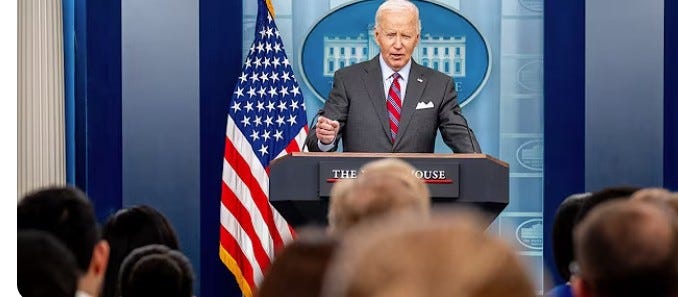In a rational Republican Party, Ron DeSantis and Nikki Haley would be frontrunners battling in South Carolina for the right to face President Joe Biden in November. Donald Trump, having lost by over 7 million votes as an incumbent in 2020 and facing multiple felony trials in 2024, would be out of the spotlight. As a party out of power in the White House and the Senate, the GOP would have a robust debate over policy and electability.
But the Republican Party is not a normal political party. It is a cult of personality.
The majority of Republican primary voters still believe the lie that Trump won the 2020 election. Most Republicans in New Hampshire, which just delivered him a victory over Haley, say that Trump is fit for the presidency even if he is convicted of a felony. While the Republican primary voters who supported other candidates mostly did so out of dislike for Trump, 80 percent of those who backed Trump did so out of solid support for him personally.
Trump’s base of evangelicals, white nationalists, and hardcore conservatives thrills to his revanchist message and detests compromise with the American majority that’s backed Democrats in seven of the last eight presidential elections. The MAGA enthusiasts lack a coherent public policy framework beyond hatred of marginalized communities and Blue America in general. Could anyone outside of polling professionals define where the MAGA base stands on anything from housing policy to taxation of Wall Street profit-taking to the hypothetical defense of Taiwan?
Florida Governor DeSantis was a charmless and incompetent presidential candidate, but he recognized the socially vindictive MAGA base for what it is. He sold himself as its most effective champion. In many ways, it was a wise strategy. Reelected in a landslide, DeSantis has been more effective as governor than Trump was as president. The Yale College and Harvard Law School graduate leveraged the power of the state to wage a reactionary crusade against unions, trans persons, and even corporations. His all-out war with The Walt Disney Company, the state’s most powerful employer, as well as its top universities, in the service of anti-LGBT and pro-racist agenda, achieved significant success. Liberals in Florida are rightly terrified of DeSantis—and nationally, liberals were lucky he proved so inept in his presidential bid and that the MAGA movement proved impossible to displace. The 45-year-old would have been a brutally motivated and efficient far-right Republican nominee and president had he been nominated at this year’s Republican National Convention in Milwaukee and sworn in at next year’s inauguration.
But the MAGA base, which is to say a plurality if not a majority of the GOP, rejected DeSantis even in Iowa, where he campaigned in 99 counties and saw a plausible avenue to victory among the evangelicals who famously dominate the caucuses. Indeed, Trump managed to flank DeSantis from the left, nicknaming him “Ron DeSanctimonious” and presenting himself in some ways as a more reasonable politician while losing none of his far-right supporters. Having delivered a conservative Supreme Court supermajority that abolished a Constitutional right to an abortion, Trump has gone squirrely about his current position on abortion, but he’s been broadly critical of draconian bans on the procedure like the six-week Florida standard signed by DeSantis. That was of no matter to Iowa evangelicals who put the libertine of Mar-a-Lago on the winner’s stand.
If Republicans wanted a more electable candidate to defeat Joe Biden, they had an obvious choice in former South Carolina Governor and United Nations Ambassador Nikki Haley. Haley consistently dominates both Trump and DeSantis in head-to-head polling against Biden. Despite her actual extremist positions, she presents herself as a more reasonable and moderate Republican alternative who holds greater appeal to women and independents than the Trump/DeSantis caveman shtick. Her being of minority descent and having earned her greatest fame negotiating the takedown of the Confederate flag as South Carolina governor, plus an amiable demeanor, might have put her in as good a position to win independent and Democratic votes as any GOP nominee in 20 years. It is hard to say how well that front would hold up in the spotlight of a general election campaign. But a Republican voter who wanted the safest bet to paint the White House red in 2024 would select Haley and not put the party’s nomination in the hands of Trump for a third time. Yet the 51-year-old was resoundingly defeated in Iowa and New Hampshire as politicians from her state, including Tim Scott, whom she appointed to the U.S. Senate, and Representative Nancy Mace, dropped any Trump wariness they once displayed and winged to New Hampshire to bend the knee before the former president.
The Democratic base does not behave this way. It nominated Adlai Stevenson II for president twice (in 1952 and 1956) to take on Dwight D. Eisenhower. Still, by 1960, despite the nostalgic pangs of many liberals for the former Democratic governor of Illinois, the party moved on to a new generation of leadership by nominating Senator John F. Kennedy, despite a last-ditch effort by Stevenson to secure the nomination at the Democratic National Convention in Los Angeles. The Democratic Party was not a cult, then or now.
Indeed, Democrats tend to behave in coherent and predictable ways in primary elections. Committed progressives tend to back candidates like Senators Elizabeth Warren and Bernie Sanders, politicians with the farthest left positions that are both popular and within the realm of the possible. But most of the Democratic primary base tends to focus heavily on electability, closely watching public polling and voting defensively for better or worse. Then-former Vice President Biden did not start as the most popular candidate in the 2020 election and seemed perilously close to suspending his campaign multiple times. Still, public polling suggested he would perform best against Trump, and it is no accident that the party eventually coalesced around him. Democratic debates focus heavily on policy, with candidates staking out definable positions on fundamental issues beyond opposition to whatever conservatives are doing that week.
Republicans behaved somewhat similarly until the last decade, choosing between styles and ideologies among conservative archetypes like John McCain, George W. Bush, Mitt Romney, and Newt Gingrich. However, the Republican Party is now defined by its loyalty to Trump.
While Trump can win this fall’s presidential election, the GOP obsession with Trump will probably prove fatal. At the same time, conservative think tanks are busy plotting the details of establishing a far-right Trump regime in America, and the former president himself rambles aimlessly in his speeches. The 77-year-old is not only weaker against Biden than DeSantis and Haley, but his popularity among moderates and independents is abysmal. His theory of victory is predicated on low enthusiasm among Democrats, continued frustration with the economy, which may be misplaced as voter perceptions of the economy improve, as well as third-party chaos in the form of Robert F. Kennedy Jr., Cornel West, Jill Stein, and whatever No Labels comes up with.
And, of course, Trump’s upcoming trials present an overwhelming danger to Republican chances in November to recapture the White House and the Senate, where the party is tantalizingly close to reclaiming control of the chamber and to its minimal grasp on the House. Swing voters are likely to abandon Trump if he is a convicted felon, and even if there is no verdict by November, any trial would disrupt Trump’s ability to campaign. Being in jail didn’t stop Eugene Debs from campaigning on the Socialist ticket in 1920, but it didn’t help.
But Republican voters don’t care what baggage Trump carries. Again, he may win the White House this year, but it’s a bad bet. Cults of personality tend to be impervious to logic and reason. They support Dear Leader until the bitter end.










